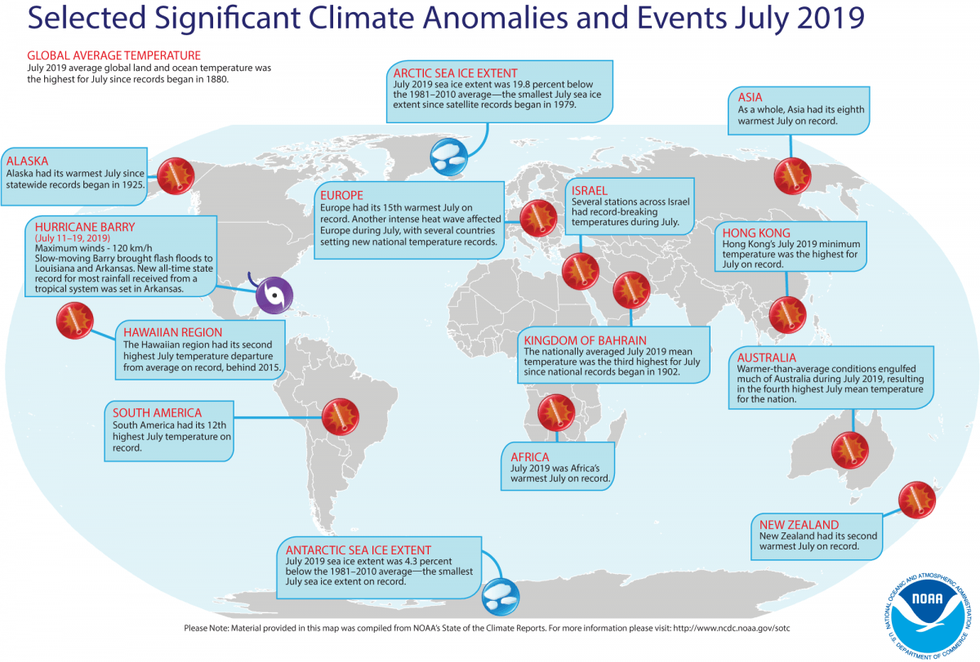

SUBSCRIBE TO OUR FREE NEWSLETTER
Daily news & progressive opinion—funded by the people, not the corporations—delivered straight to your inbox.
5
#000000
#FFFFFF
To donate by check, phone, or other method, see our More Ways to Give page.


Daily news & progressive opinion—funded by the people, not the corporations—delivered straight to your inbox.

NOAA revealed Thursday that July 2019 was the hottest month on record since the U.S. government began recording temperature date in the lat 19th century. (Photo: Lukas Schulze/Getty Images)
As climate scientists raise alarm over hotter and hotter global temperatures, a top U.S. weather agency reported on Thursday that July 2019 was the hottest month the planet has ever experienced since the government began recording global temperatures nearly 140 years ago.
NOAA's monthly Global Climate Report revealed that last month the average worldwide temperature was 1.71 degrees Fahrenheit above the average temperature observed in the 20th century.
Last month--the hottest July on record since temperature data was first recorded--broke the previous record set in July 2016.
July's average global temperature represents a continuation of a pattern that began more than 30 years ago; last month was the 415th consecutive month when the world was warmer than average. Last month, NOAA reported that June 2019 was the hottest June on record.
The trend seen year-round over the past three decades has been coupled with a pattern observed over an even longer period of time; July 2019 was the 43rd July in a row with above-average temperatures.
Rep. Ro Khanna (D-Calif.) warned on Twitter that the trends scientists are observing represent a "new normal under climate change," which won't change unless the U.S. takes "bold action to confront the climate crisis."
Khanna is a staunch supporter of decisive climate action like the Green New Deal, which would replace the United States' fossil fuel industry, one of the world's biggest contributers to the climate crisis, with a renewable energy economy.
The high global temperatures last month were reflected in news stories about extreme heatwaves throughout Europe and wildfires in Greenland.

Scientists also recorded record-low levels of sea ice in the coldest parts of the world. In the Arctic in July, ice was recorded as being 19.8 percent lower than average.
"We are seeing record after record after record," Marco Tedesco, a climate scientist at Columbia University, told Grist this week.
"It looks like the worst case scenario put forward by the IPCC could be an underestimate because we are seeing ice melting now that we expected 30 to 40 years from now," he added. "It's alarming because it's very fast-paced and the consequences are hard to predict."
Dear Common Dreams reader, The U.S. is on a fast track to authoritarianism like nothing I've ever seen. Meanwhile, corporate news outlets are utterly capitulating to Trump, twisting their coverage to avoid drawing his ire while lining up to stuff cash in his pockets. That's why I believe that Common Dreams is doing the best and most consequential reporting that we've ever done. Our small but mighty team is a progressive reporting powerhouse, covering the news every day that the corporate media never will. Our mission has always been simple: To inform. To inspire. And to ignite change for the common good. Now here's the key piece that I want all our readers to understand: None of this would be possible without your financial support. That's not just some fundraising cliche. It's the absolute and literal truth. We don't accept corporate advertising and never will. We don't have a paywall because we don't think people should be blocked from critical news based on their ability to pay. Everything we do is funded by the donations of readers like you. Will you donate now to help power the nonprofit, independent reporting of Common Dreams? Thank you for being a vital member of our community. Together, we can keep independent journalism alive when it’s needed most. - Craig Brown, Co-founder |
As climate scientists raise alarm over hotter and hotter global temperatures, a top U.S. weather agency reported on Thursday that July 2019 was the hottest month the planet has ever experienced since the government began recording global temperatures nearly 140 years ago.
NOAA's monthly Global Climate Report revealed that last month the average worldwide temperature was 1.71 degrees Fahrenheit above the average temperature observed in the 20th century.
Last month--the hottest July on record since temperature data was first recorded--broke the previous record set in July 2016.
July's average global temperature represents a continuation of a pattern that began more than 30 years ago; last month was the 415th consecutive month when the world was warmer than average. Last month, NOAA reported that June 2019 was the hottest June on record.
The trend seen year-round over the past three decades has been coupled with a pattern observed over an even longer period of time; July 2019 was the 43rd July in a row with above-average temperatures.
Rep. Ro Khanna (D-Calif.) warned on Twitter that the trends scientists are observing represent a "new normal under climate change," which won't change unless the U.S. takes "bold action to confront the climate crisis."
Khanna is a staunch supporter of decisive climate action like the Green New Deal, which would replace the United States' fossil fuel industry, one of the world's biggest contributers to the climate crisis, with a renewable energy economy.
The high global temperatures last month were reflected in news stories about extreme heatwaves throughout Europe and wildfires in Greenland.

Scientists also recorded record-low levels of sea ice in the coldest parts of the world. In the Arctic in July, ice was recorded as being 19.8 percent lower than average.
"We are seeing record after record after record," Marco Tedesco, a climate scientist at Columbia University, told Grist this week.
"It looks like the worst case scenario put forward by the IPCC could be an underestimate because we are seeing ice melting now that we expected 30 to 40 years from now," he added. "It's alarming because it's very fast-paced and the consequences are hard to predict."
As climate scientists raise alarm over hotter and hotter global temperatures, a top U.S. weather agency reported on Thursday that July 2019 was the hottest month the planet has ever experienced since the government began recording global temperatures nearly 140 years ago.
NOAA's monthly Global Climate Report revealed that last month the average worldwide temperature was 1.71 degrees Fahrenheit above the average temperature observed in the 20th century.
Last month--the hottest July on record since temperature data was first recorded--broke the previous record set in July 2016.
July's average global temperature represents a continuation of a pattern that began more than 30 years ago; last month was the 415th consecutive month when the world was warmer than average. Last month, NOAA reported that June 2019 was the hottest June on record.
The trend seen year-round over the past three decades has been coupled with a pattern observed over an even longer period of time; July 2019 was the 43rd July in a row with above-average temperatures.
Rep. Ro Khanna (D-Calif.) warned on Twitter that the trends scientists are observing represent a "new normal under climate change," which won't change unless the U.S. takes "bold action to confront the climate crisis."
Khanna is a staunch supporter of decisive climate action like the Green New Deal, which would replace the United States' fossil fuel industry, one of the world's biggest contributers to the climate crisis, with a renewable energy economy.
The high global temperatures last month were reflected in news stories about extreme heatwaves throughout Europe and wildfires in Greenland.

Scientists also recorded record-low levels of sea ice in the coldest parts of the world. In the Arctic in July, ice was recorded as being 19.8 percent lower than average.
"We are seeing record after record after record," Marco Tedesco, a climate scientist at Columbia University, told Grist this week.
"It looks like the worst case scenario put forward by the IPCC could be an underestimate because we are seeing ice melting now that we expected 30 to 40 years from now," he added. "It's alarming because it's very fast-paced and the consequences are hard to predict."